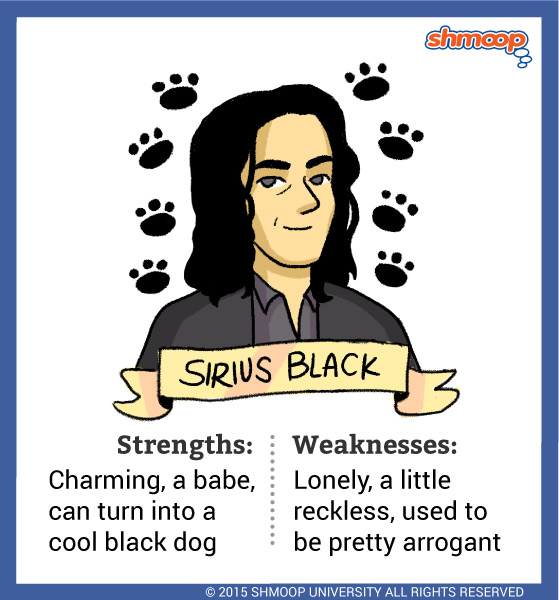Character Analysis

(Click the character infographic to download.)
Shape-Shifter
As the Prisoner of Azkaban, Sirius is kind of the star of the show here. But we spend most of the book asking if the real Sirius Black will please stand up.
It seems like every other chapter, we get a new version of the man. Like Harry, Sirius is a public figure. And like Voldemort, Sirius is a public figure of evil – an entire legend has sprung up around the man and his improbable escape from Azkaban simply fuels the fire there. Black is the wizarding world's Jack the Ripper or Ted Bundy – the terrifying, real-life killer that's become larger-than-life and nearly mythical, in some ways. So, it makes sense that our first exposure to Sirius is through the lens of nightmare figure. As the novel progresses, though, we get more and more details about the man himself, not just the legendary murderer and Voldemort crony.
For the first section of the novel, Black is the terrifying and insane murderer who is now on the run and gunning for Harry.
"Laughed," said Stan. "Jus' stood there an' laughed. An' when reinforcements arrived from the Ministry of Magic got there, 'e went wiv 'em quiet as anyfink, still laughing 'is 'head off. 'Cos 'e's mad, inee Ern? Inee mad?" (3.75)
However, a marked shift occurs after Harry overhears a group of adults discussing the "real" story of Sirius Black. Harry then discovers that Black was his father's best friend, was named Harry's godfather, and betrayed the Potters to Voldemort. Black becomes simultaneously more outrageously evil and more human here, which is a scary combo. He's suddenly this real person who chose to go over to the dark side.
A hatred such as Harry had never known before was coursing through Harry like poison. He could see Black laughing at him through the darkness, as though somebody had pasted the picture from the album over his eyes. (11.1.11)
Finally, though, we actually meet Sirius and learn the truth – he's really a tragic hero, betrayed by a friend and stuck with the guilt of playing an unintentional role in his best friend's murder. In the short time we get to see him in person, Sirius is alternately sympathetic and scary.
"I meant to," he growled, his yellow teeth bared, "but little Peter got the better of me [...] not this time, though!"
And Crookshanks was thrown to the floor as Black lunged at Scabbers; Ron yelled with pain as Black's weight fell on his broken leg. (18.5-6)
We can't really fault Sirius for his somewhat violent emotional displays, where he veers between totally in control and being a shouting maniac. A dozen years in the world's worst prison, for a crime he didn't even commit, would do a number on anyone's psyche.
Flawed Mentor
In the end, though, we have to wonder about Harry's burgeoning relationship with his long-lost godfather. Sirius, oddly enough, represented freedom to Harry – Sirius offers to take him away from the Dursleys. Yet that turned out to be a total pipe dream. And how legit could Sirius's offer have been anyway? The dude's been in jail for twelve years and he suddenly wants to become the full-time guardian to a thirteen-year-old kid?
Another character trait of Sirius's is demonstrated, though not fully fleshed out here (spoiler alert – it will come into play in future books). Sirius has a case of severe arrested development; in a lot of ways he's very immature. We can see this through his interactions with Snape. Here's what Sirius says about almost getting Snape killed by werewolf Lupin when they were schoolboys:
"It served him right," he sneered. "Sneaking around, trying to find out what we were up to [...] hoping he could get us expelled [...]." (18.57)
Sirius is channeling his school days here, once again. In prison he had nothing but time to dwell on his past, so it makes sense that Sirius himself never really progressed beyond it, in some ways.